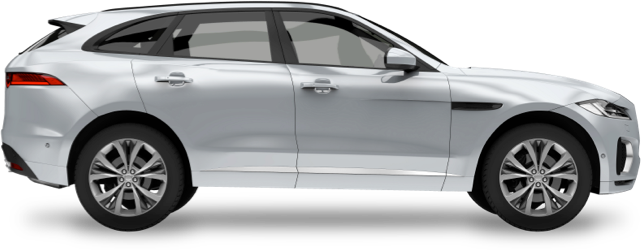- Online car hire since 2005
Car hire Austria
Save time and money. We compare the offers of car rental companies in Austria on your behalf.
- Free cancellation Up to 48 hours prior to the scheduled pick up time
- Best price guarantee Have you found a better price? Let us know and we will make you a better offer.
- Already 500,000+ bookings More than half a million people preceded you 24000+ pick-up locations Locations around the world
- 24000+ pick-up locations Locations around the world
Car hire Austria
EasyTerra Car Hire Austria is an independent car hire comparison site. Our system compares prices from well-known car hire companies so as a customer you can always book your hire car through us at a competitive rate.
Car rental offers in Austria
Whether you're looking for a small rental car or a station wagon for the entire family, we will always have a suitable vehicle for the lowest price. Below are some examples from our selection in Austria.

-
Autounion Car Rental From£ 15 /day -
wheego From£ 17 /day -
Sicily by Car From£ 20 /day

-
Green Motion From£ 16 /day -
Flizzr From£ 25 /day -
Sixt From£ 26 /day

-
Autounion Car Rental From£ 17 /day -
Sicily by Car From£ 22 /day -
wheego From£ 26 /day

-
Green Motion From£ 17 /day

-
Green Motion From£ 19 /day -
Europcar From£ 30 /day -
Sixt From£ 31 /day

-
Green Motion From£ 20 /day

-
Sixt From£ 25 /day

-
Megadrive From£ 26 /day

-
Megadrive From£ 27 /day

-
Autounion Car Rental From£ 15 /day -
Green Motion From£ 17 /day -
wheego From£ 18 /day

-
Autounion Car Rental From£ 15 /day

-
Autounion Car Rental From£ 17 /day -
Sicily by Car From£ 19 /day -
Green Motion From£ 20 /day

-
Autounion Car Rental From£ 17 /day

-
wheego From£ 18 /day -
Sicily by Car From£ 19 /day

-
Sicily by Car From£ 19 /day -
wheego From£ 26 /day

-
wheego From£ 22 /day -
Green Motion From£ 24 /day

-
Flizzr From£ 25 /day -
Sixt From£ 26 /day -
Alamo From£ 26 /day

-
Megadrive From£ 28 /day

-
Autounion Car Rental From£ 16 /day -
wheego From£ 31 /day

-
Autounion Car Rental From£ 16 /day -
Green Motion From£ 18 /day -
Alamo From£ 27 /day

-
Autounion Car Rental From£ 18 /day -
wheego From£ 36 /day

-
Autounion Car Rental From£ 17 /day -
Green Motion From£ 28 /day -
Alamo From£ 32 /day

-
Autounion Car Rental From£ 18 /day -
Green Motion From£ 21 /day -
Sicily by Car From£ 31 /day

-
wheego From£ 19 /day -
Sicily by Car From£ 23 /day -
U-Save Auto Rental From£ 29 /day

-
Autounion Car Rental From£ 20 /day -
Alamo From£ 32 /day -
Enterprise From£ 34 /day

-
Sicily by Car From£ 20 /day -
wheego From£ 21 /day -
U-Save Auto Rental From£ 31 /day

-
Sicily by Car From£ 22 /day -
wheego From£ 29 /day -
U-Save Auto Rental From£ 61 /day

-
wheego From£ 24 /day -
Green Motion From£ 27 /day -
Thrifty From£ 38 /day

-
wheego From£ 24 /day -
Green Motion From£ 25 /day -
Sicily by Car From£ 30 /day

-
Autounion Car Rental From£ 27 /day

-
Autounion Car Rental From£ 25 /day

-
wheego From£ 25 /day -
Sicily by Car From£ 26 /day -
Megadrive From£ 37 /day

-
Sicily by Car From£ 28 /day -
wheego From£ 35 /day -
Megadrive From£ 40 /day

-
Autounion Car Rental From£ 26 /day -
Europcar From£ 46 /day -
Green Motion From£ 67 /day

-
Sicily by Car From£ 29 /day -
wheego From£ 33 /day -
U-Save Auto Rental From£ 66 /day

-
wheego From£ 27 /day

-
wheego From£ 28 /day -
U-Save Auto Rental From£ 46 /day -
Sicily by Car From£ 50 /day

-
wheego From£ 33 /day -
U-Save Auto Rental From£ 45 /day -
Sicily by Car From£ 50 /day

-
Alamo From£ 37 /day

-
Alamo From£ 34 /day -
Enterprise From£ 37 /day -
Megadrive From£ 42 /day

-
Enterprise From£ 34 /day -
Alamo From£ 38 /day

-
Buchbinder From£ 38 /day -
Megadrive From£ 42 /day -
Alamo From£ 60 /day

-
Buchbinder From£ 37 /day -
Megadrive From£ 41 /day -
Alamo From£ 56 /day

-
Enterprise From£ 37 /day -
Alamo From£ 41 /day

-
Enterprise From£ 38 /day -
Alamo From£ 40 /day

-
Megadrive From£ 46 /day -
Buchbinder From£ 47 /day -
Flizzr From£ 59 /day

-
Buchbinder From£ 45 /day

-
Megadrive From£ 47 /day -
Europcar From£ 56 /day -
Budget From£ 59 /day

-
Megadrive From£ 46 /day -
Buchbinder From£ 50 /day -
Sixt From£ 67 /day

-
Buchbinder From£ 47 /day

-
Megadrive From£ 51 /day

-
Megadrive From£ 51 /day -
Budget From£ 63 /day -
Europcar From£ 67 /day

-
Megadrive From£ 53 /day

-
Budget From£ 56 /day -
Avis From£ 60 /day -
Sixt From£ 61 /day

-
Budget From£ 49 /day -
Avis From£ 56 /day -
Buchbinder From£ 59 /day

-
Hertz From£ 55 /day -
Thrifty From£ 58 /day

-
Budget From£ 58 /day -
Avis From£ 61 /day -
Buchbinder From£ 61 /day

-
Flizzr From£ 60 /day -
Budget From£ 61 /day -
Sixt From£ 63 /day

-
Avis From£ 66 /day

-
Flizzr From£ 62 /day -
Sixt From£ 62 /day -
Europcar From£ 70 /day

-
Sixt From£ 64 /day -
Thrifty From£ 73 /day -
Budget From£ 73 /day

-
Sixt From£ 66 /day -
Budget From£ 71 /day -
Thrifty From£ 91 /day

-
Sixt From£ 64 /day -
Avis From£ 77 /day

-
Green Motion From£ 24 /day

-
Green Motion From£ 25 /day -
Thrifty From£ 33 /day -
Hertz From£ 37 /day

-
Green Motion From£ 28 /day

-
Green Motion From£ 27 /day -
Thrifty From£ 38 /day -
Hertz From£ 39 /day

-
Green Motion From£ 28 /day

-
Green Motion From£ 29 /day -
Thrifty From£ 47 /day -
Hertz From£ 49 /day

-
Sicily by Car From£ 31 /day -
Buchbinder From£ 34 /day -
Autounion Car Rental From£ 34 /day

-
wheego From£ 30 /day -
Alamo From£ 30 /day -
Sicily by Car From£ 30 /day

-
Buchbinder From£ 32 /day -
Megadrive From£ 34 /day

-
Flizzr From£ 59 /day -
Sixt From£ 63 /day

-
Buchbinder From£ 60 /day -
Thrifty From£ 96 /day -
Hertz From£ 106 /day

-
Megadrive From£ 66 /day

-
Europcar From£ 62 /day

-
Sixt From£ 69 /day

-
Sixt From£ 71 /day -
Europcar From£ 93 /day -
Thrifty From£ 95 /day

-
Buchbinder From£ 72 /day -
Hertz From£ 115 /day -
Avis From£ 126 /day

-
Megadrive From£ 72 /day

-
Europcar From£ 83 /day

-
Flizzr From£ 25 /day -
Sixt From£ 26 /day

-
Sixt From£ 35 /day

-
Thrifty From£ 72 /day -
Hertz From£ 80 /day

-
Hertz From£ 88 /day -
Thrifty From£ 94 /day

-
Sixt From£ 161 /day

-
Autounion Car Rental From£ 17 /day -
wheego From£ 25 /day -
Sicily by Car From£ 26 /day

-
Autounion Car Rental From£ 20 /day -
Sicily by Car From£ 28 /day -
Alamo From£ 32 /day

-
Autounion Car Rental From£ 23 /day

-
wheego From£ 24 /day -
Green Motion From£ 25 /day

-
Autounion Car Rental From£ 25 /day

-
Autounion Car Rental From£ 25 /day -
Flizzr From£ 45 /day

-
Autounion Car Rental From£ 27 /day

-
Autounion Car Rental From£ 26 /day -
Europcar From£ 46 /day -
Green Motion From£ 96 /day

-
Autounion Car Rental From£ 31 /day -
Europcar From£ 44 /day

-
Hertz From£ 32 /day -
Thrifty From£ 34 /day

-
Sixt From£ 29 /day

-
Europcar From£ 33 /day -
Hertz From£ 49 /day

-
Europcar From£ 34 /day

-
Hertz From£ 54 /day

-
Hertz From£ 35 /day -
Thrifty From£ 37 /day

-
Sixt From£ 35 /day

-
Avis From£ 66 /day

-
Avis From£ 64 /day
Popular cities in Austria
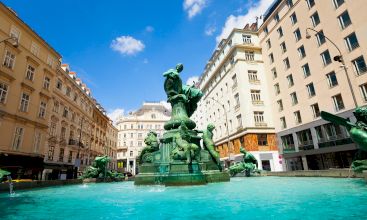
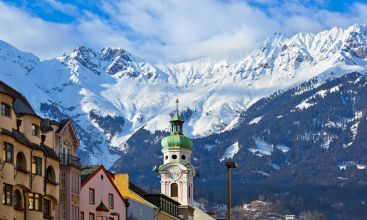
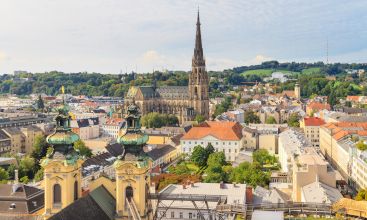
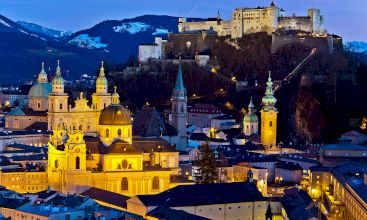
Useful tips for a well-prepared trip
Which insurance should I choose, and what's the deal with the deposit? Read our articles with useful information and tips to ensure you choose the right rental car for you.
When to book a rental car in Austria
Car rental locations in Austria
EasyTerra Car Hire compares rental car prices at the following destinations
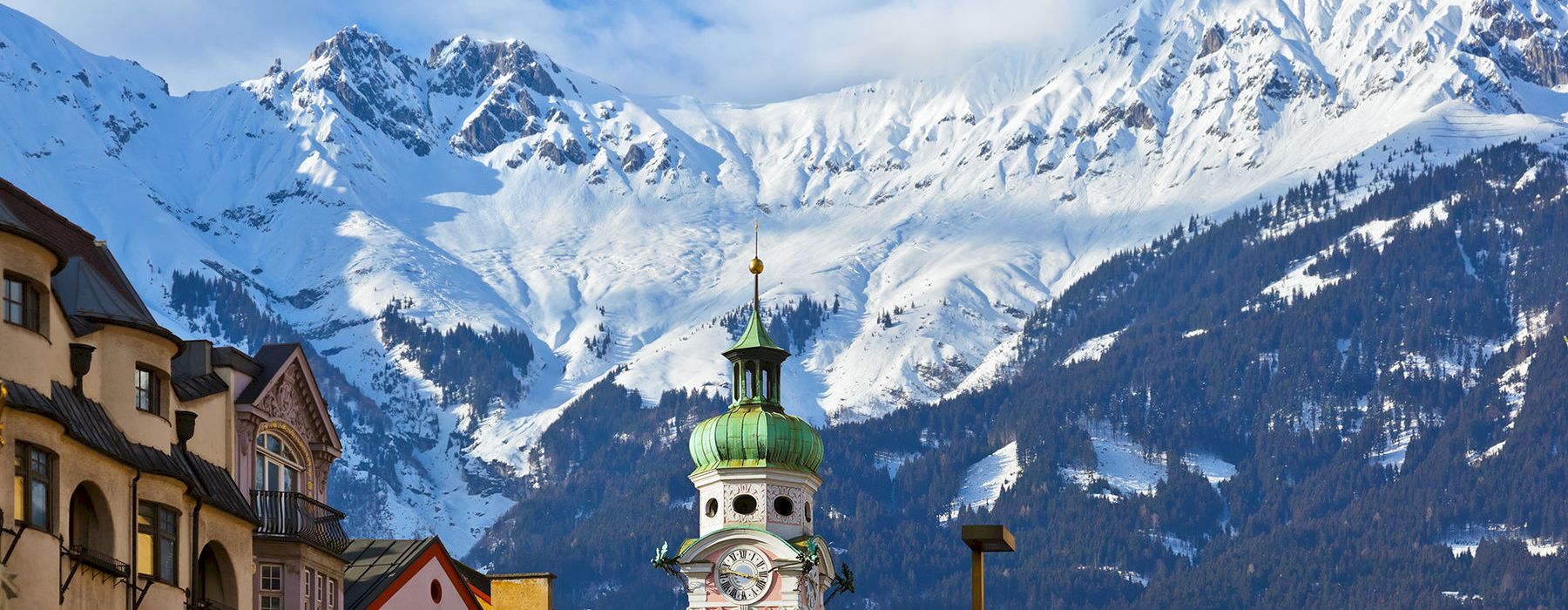
Location information for Austria
Austria is best explored by rental car. EasyTerra Car Hire has over 32 pick-up locations in Austria. This means there is always a pick-up location close to your destination.
Most popular car hire locations in Austria
Introduction
Austria is a popular vacation destination, both in summer and winter. The many mountains offer the perfect opportunity for a unique winter sports vacation. In the summer you can have wonderful walks in the Alps. Vienna is a beautiful city with a rich culture. The city offers museums, theaters, festivals, visual arts, concerts and folklore. Austria is very well anticipated on the many tourists that visit the country each year. Everywhere you can find accommodations and restaurants of a good quality.
History
The present Austria has been inhabited by different people. Until the tenth century there have lived Romans, Huns, Lombards, Ostrogoths, Bavarians and Franks. After that the country was governed by the Babenbergers for three centuries. After the last Babenberger died in 1246, decades of fights for the succession followed.
In 1278 the German king Rudolf I of Habsburg knew how to come into power in Austria. The Habsburgers have governed the country until 1806. In that time the country experienced an enormous flourishing period and thanks to strategic wedlocks and conquests the Habsburgers ruled over large parts of Europe.
Napoleon seemed a powerful opponent. He forced Austria to become his ally in his battle against the Holy Roman Empire of the German Nation. After the defeat of Napolean in 1813, Europe was divided once again in 1815. With this Austria came into power over a large part of Italy and Central Europe.
In 1848 revolutions broke loose in Vienna, Prague, Milan and Hungary. Emperor Franz Jozef I came into power. Under his government, Austria lost a war with the Prussia. Prussia won the power over the German states. Austria wanted more influence and therefore the empire changed into the double monarchy Austria-Hungary in 1867. Hungary kept an independence to a great extent and was only connected to Austria through the head of state.
After World War I the double monarchy came to an end. Austria-Hungary was divided in different independent states (such as Czechoslovakia, Hungary and Yugoslavia). In 1918 Austria became a republic. Austria was a small, poor country and wanted to join with Germany. The Treaty of Versailles prohibited this.
In 1938 Hitler invaded Austria and saw to it that the Nazi Seyss-Inquart imperial became governor of Austria. This was the beginning of World War II for Austria. After the defeat of Hitler, Austria was occupied by the Allies. Not until 1955 Austria became an independent country. The country promised to consider strict neutrality. The same year Austria became member of the United Nations.
From 1970 to 1982 the socialist Bruno Kreisky was Federal Chancellor of Austria. In 1986 Kurt Waldheim won the presidential election, despite his controversial war past. The United States protested vehemently, however Waldheim kept his presidency until 1992. He was succeeded by Thomas Klestil. In 1995 Austria became member of the EU.
In the years that followed, the right radical Freedom Party (FPÖ) under the direction of Jörg Haider grew. Despite his positive remarks regarding Hitler′s National Socialism, the Freedom Party achieved several times a large election victory. Internationally people responded furiously. The EU partners lowered their status of diplomatic ties with Austria and contracts were broken as well. Not until 2000 Haider resigned as party leader. In 2004 the socialist Heinz Fischer became the new president of the country. He was the first socialistic head of state in eighteen years.
Society and culture
Austria has approximately eighteen million inhabitants. More than half lives in or around the large cities. The capital Vienna counts more than two million people. The majority of the population exists of German-speaking Austrians. Furthermore there are Croatians, Slovenes and Hungarians.
About 80% of the population is Roman Catholic. Besides that a small percentage is protestant (5%) or non-religious (8%). Remaining inhabitants are Jewish or Islamic.
A very large part of the population (about 97%) speaks German. Therefore this is the official language of the country. The minorities in Austria (such as Hungarians, Czechs and Slovenes) often still speak their own language.
Austria has an enormous cultural wealth. The country is known for its architecture and classical music. Vienna is not only the city of the baroque, but since the eighteenth century also a cultural center in the field of music and literature. Many famous composers are from Austria, such as Mozart, Strauss, Schuber and Haydn. The Viennese waltz has also become world-famous. This couple dance is dominated by the family Strauss.
Austrians stand by traditions and therefore people still dance the waltz at special occasions. Besides classical music the Austrian culture is known for the many museums, monasteries, concerts and festivals. The country offers excellent possibilities for winter sports. Therefore favorite sports in Austria are skiing, cross-country skiing, ice skating and curling. Many Austrians also like a good game of soccer.
Political situation
Austria is a federation of nine states (Bundesländer) and has a parliamentary democracy with a president as the head of state. The president is at the head of the Federal Republic. He is directly elected for a period of six years. The president appoints the leader of the parliament. Austria's current president is Heinz Fischer (since 2004). The ministers form the government and give account to the parliament. The prime minister is Alfred Gusenbauer (since 2007).
The parliament consists of the Nationalrat and the Bundesrat. The Nationalrat has the legislative power with 183 members. The members are chosen through elections every four years. Each inhabitant of Austria who is 19 years or older has voting right. The Bundesrat exists of 64 members who are chosen by the parliaments of the nine states.
Important political parties are the social democratic party (SPÖ) and the conservative party (ÖVP). The right radical Freedom Party (FPÖ) has always been a very important party as well. This part, under the direction of Jörg Haider has been discontinued in 2005. Haider started another party, namely the Bündnis Zukunft Österreich (BZÖ). This party is milder than the previous party of Haider.
Economy
Austria belongs to one of the most prosperous countries of Europe. The market economy is well developed and the living standard is high. The share of the service industry to the GNP is the largest. Therefore more than half of the inhabitants work in this sector. Approximately 30% of the working population works in the industrial sector. Important industrial sectors are machine industry, iron and steel, textile, wood and food. The agriculture provides in its own demand for a large percentage. Most agricultural areas can be found in the north and north-east of the country. Some important agricultural products are potatoes, sugar beets, wine, fruit, dairy products, corn and grains.
Austria's important trading partners are Germany, Italy, France, Japan, United States, Switzerland, The Netherlands and Great Britain. Austria trades in machines and equipment, motor vehicles, metal goods and food products. Furthermore iron and steel, textile, paper and cardboard are important export products. Chemical resources and oil (products) are important import products.
The tourism has become an important source of income. Austria is a very popular holiday destination, mainly for the winter sports. In summer the Austrian landscape attracts many hikers and mountain climbers. Also Vienna is a popular destination for a city trip.
In 2002 the euro became an official currency in Austria. Before that time one paid with the Austrian Schilling (ATS).
Geography and climate
Austria lies in the center of Europe and borders on many different countries: Germany, Czech Republic and Slovakia (north), Hungary (east), Italy and Slovenia (south) and Switserland and Liechtenstein (west). The largest part of Austria exists of low mountain range and high mountains: the Alps. The Alps characterize itself by enormous mountain masses, impressive glaciers and beautiful side valleys. There are many clean lakes in the mountain areas. The Attersee is the largest Alpine lake. The Grossglockner (almost 3,800 meters) is the country's highest mountain.
The eastern part of Austria exists of hills and plane grounds. The river Donau can be found here as well. Together with its tributary river the Inn, the Donau is the country's most important river. Besides the Inn, the Herberg, Enns and Mur also flow into the Donau. The Neusiedler Meer is the largest lake of the country (in the east).
Austria exists of nine states (Bundesländer). Each state has its own capital city. These are the nine states with corresponding capital cities: Vienna (Vienna), Stiermarken (Graz), Vorarlberg (Bregenz), Tirol (Innsbruck), Salzburg (Salzburg), Carinthia (Klagenfurt), Upper Austria (Linz), Lower Austria (Sankt Pölten) and Burgenland (Eisenstadt). Vienna lies at the river Donau, in the east of the country.
Austria is a relatively small country, but the climate differences within the country are big. In the east of the country there is a continental climate. The south of the country has a more Mediterranean climate with warm and dry summers. The west of the country has a lot of rainfall. The Alps are characterized by a high mountains climate. The differences between day and night, and summer and winter are big. During the winter there is a lot of snowfall and the summers are cool. In some places the temperature does not get over ten degrees Celsius.
Traffic and infrastructure
Austria has a well developed rail and road network. The total road network counts almost 134,000 kilometers. An Autobahnvignet (road tax sticker) is obligated on the Austrian highways. They can be bought at the borders. In winter time many mountain roads are closed. On these mountain roads you must take gradients into account and it is also advisable to shift to a lower gear on time. Heavy vehicles have priority over small vehicles.
The rail road network is more than 6,000 kilometers long. The mountain regions are less reachable by train. There are national as well as international connections between important cities. Austria's largest rail road company is the Österreichische Bundesbahnen (ÖBB). The bus traffic is presided over by the government, municipalities and private companies. Busses run to almost each village.
One of Austria's most important airports is Schwechat Airport, in Vienna. Other important airports are Graz Airport, Innsbruck Airport, Salzburg Airport, Klagenfurt Airport and Linz Airport. Both international as national flights depart from these airports. The national airline is Austrian Airlines. National flights are carried out by Tyrolean Airways.
The Donau is one of the most important waterways in Europe. Freight transport between the east and the west of Europe is often done via this river. The total length of the Austrian waterways is approximately 360 kilometers.
Food and drink
The different countries that once belonged to the Habsburg Monarchy, have had influence in the Austrian kitchen. Therefore Hungarian goulash, Serbian bean soup or Italian rice is very normal on an Austrian menu. The most famous meat from Austria is probably the Wiener Schnitzel. A typical Viennese specialty is the Kaiserschmarren: chunks of pancake with powdered sugar and plum jam. Furthermore Austria is known for a number of delicious cakes: Sacher cake (with chocolate), Linzert cake (with nuts and jam) and the Malakoff cake (chocolate with rum and whipped cream). The mountain regions have their own specialties, such as Alp cheese, spring cheese and bacon from Tirol.
A popular drink in Austria is Wiener Kaffee. This is a mix of coffee and chocolate. Austrians are fond of coffee and know many different types. Vienna has real coffee houses. In the old days artists and intellectuals met each other there; nowadays the coffee houses serve to enjoy an excellent cup of Austrian coffee.
Accommodation
Austria has many hotels, vacation houses and apartments. In the skiing regions chalets or small houses can be rented everywhere. Furthermore there are sufficient camping sites, often situated in beautiful surroundings. You can also choose for a Bed & Breakfast. In general the accommodations in Austria are of a good quality and the Austrian inhabitants feel strongly about hospitality.
Time zone
Austria has time zone GMT +1. From April to October they have summer time; the clock is set one hour ahead.
External sources
For more information about Austria, we recommend Google and the following sources:
Practical information
-
CurrencyEuro
-
Driving directionRight
-
City speed limit50 km/h
-
Freeway speed limit100 km/h
-
LanguageGerman
-
Popular car categoryEconomy
What most people want to know
The following questions and answers are a selection of the most popular questions. If you do not find the answer to your question, have a look at the Frequently Asked Questions page or contact us.
- Avis
- Megadrive
- Europcar
- Enterprise
- Alamo
- Buchbinder
- Keddy By Europcar
- Budget
- GLOBAL Rent-a-Car
- Thrifty
- wheego
- InterRent
- Sicily by Car
- Green Motion
- Global Rent a Car
- U-Save Auto Rental
- Autounion Car Rental
- Hertz
- Flizzr
- Sixt
- addCarRental
- National Car Rental
- SurPrice car rentals
- Active Car Rental
- Edel & Stark
- Your Rent
- Nur Rent a car
